#please try to look at her story more in an empathic light rather than rational hindsight
Explore tagged Tumblr posts
Text
Margaretha was a victim of abuse, sure, but she never went to cops or anything? Or asked Joker to do it for her. Don't get me wrong, she was scared and I get it, but you have to try to do something.
That's the thing about abuse; it's mental, it's physical, and it's devastating because it ruins any sense of trust you have for people because your abuser convinces you no one will help you.
In Natasha's case there are several factors against her;
He said She Said; frankly if Bernard was the head of the circus, it's likely he was pretty buddy-buddy with Sergi as well because they're both abusers. Even if Natalie told the Police, Bernard AND Sergi would've convinced the cops that she's was lying.
She's a woman; divorce back then was rare, one had to prove that abuse was happening and even then it's likely they would've turned a blind eye to her suffering or potentially see her bruises as merely the result of performing.
Fear; You saw her go into a survival mindset during the first part of Closing Night. Be nice and maybe I won't get hurt. Natalie was terrified of Sergi. Not to mention the fear of leaving is greater than the fear of staying. It's even described that when Sergi died, Natalie lost any sense of stability.
I really recommend you take a look at this:
Female Dancer's whole story is trying to find her agency, something that was taken from her by Sergi.
You know, there is something I can't stop thinking about.
Why is (as far as I can tell, correct me if I'm wrong) Joker the only person that tried to do something about the abuse at Hullabaloo?
I'm not saying that what he did was right but still.
Mike knew about the abuse but didn't do anything, hell, he denied Hullabaloo being a bad place because he wasn't the one abused even tho others were. Sure, he helped Murro escape but damn dude you have problems.
Margaretha was a victim of abuse, sure, but she never went to cops or anything? Or asked Joker to do it for her. Don't get me wrong, she was scared and I get it, but you have to try to do something.
Murro ran away and never tried to contact someone to tell them what was going on, which fits his whole thing of "wanting to be the knight but not really doing anything".
Violetta didn't even realise she was being abused (from what I can tell) so I don't know what I can even say here.
And then you have Joker who was the only one to try end this shit. He didn't do that at first but he was still helping the best he can (even if only Marg, which, what the fuck dude) with the abuse, and then, when it became too much I guess, he tried to act, failed and got his ass beat, and went on a killing spree.
In a fuck up way, he was the only one to try to end the abuse at the Hullabaloo.
And end the lives of people that probably didn't have anything to do with it which is really fucked up don't do it kids.
#identity v#margaretha zelle#identity v female dancer#please try to look at her story more in an empathic light rather than rational hindsight#nothing about abuse is rational
62 notes
·
View notes
Text
Against empathy Liveblog 18
“Batson and his colleagues put subjects in a situation where they have the opportunity to do something nice—such as donating money, taking over an unpleasant task from someone else, or cooperating with someone at a cost. Some of the subjects are told nothing or are told to take an objective point of view. But others are encouraged to feel empathy—they might be told: “Try to take the other person’s perspective” or “Put yourself in that person’s shoes.”
Over and over again, Batson finds that these empathy prompts make subjects more likely to do good—to give money, take over a task, and cooperate. Empathy makes them kind.
Batson finds these effects even when helping is anonymous, when there is a justification for not helping, and when it’s easy to say no. He concludes from his work that these effects cannot be explained by a desire to enhance one’s reputation or a wish to avoid embarrassment or anything like that. Rather, empathy elicits a genuine desire to make another person’s life better.”
I’m VERY interested in how this is so bad you recommend people stop.
“Even among psychologists who should know better, images derived from PET or fMRI scans are seen as reflecting something more scientific—more real—than anything else a psychologist could discover. There is a particular obsession with localization, as if knowing where something is in the brain is the key to explaining it.”
Bruh.
Bruh.
Extraordinary claims require extraordinary evidence, and you’re making very strong versions of your claims. Please acknowledge that.
“If you’re one of those people who doesn’t believe something is real unless you see it in the brain, you’ll be relieved to hear that empathy actually does exist. It really does light up the brain. Actually, at first blush, empathy looks as if it’s everywhere in the brain. One scholar describes at length what he calls “an empathy circuit in the brain,” but this “circuit” contains ten major brain areas, some of them big chunks of brain stuff, larger than a baby’s finger, like the medial prefrontal cortex, the anterior insula, and the amygdala—all of which are also engaged in actions and experiences that have nothing to do with empathy.”
Interesting. Yay data!
“It turns out, though, that this the-whole-brain-does-it conclusion arises because neuroscientists—along with psychologists and philosophers—are often sloppy in their use of the term empathy. Some investigators look at what I see as empathy proper—what happens in the brain when someone feels the same thing they believe another person is feeling. Others look at what happens when we try to understand other people, usually called “social cognition” or “theory of mind” but sometimes called “cognitive empathy.” Others look at quite specific instantiations of empathy (such as what happens when you watch someone’s face contort in disgust), and still others study what goes on in the brain when a person decides to do something nice for another person, which is sometimes called “prosocial concern” but which one normally thinks of as niceness or kindness. Once you start pulling these different phenomena apart, which I’ll do below, things get more interesting, and you see how these different capacities relate to one another.”
Fair—I can see how people might looks at a whole brain going FWEEEEEE and assume the thing is super important, only to miss that they’ve over defined the thing.
Still not sure you haven’t under defined it, let’s see what you have to say
“The first finding is that an empathic response to someone else’s experience can involve the same brain tissue that’s active when you yourself have that experience. So “I feel your pain” isn’t just a gooey metaphor; it can be made neurologically literal: Other people’s pain really does activate the same brain area as your own pain, and more generally, there is neural evidence for a correspondence between self and other.”
For the people who think “how can you feel MY pain? Is that magic, NTs? Lolol.” What we mean!
“As you might be able to tell from the title of his book, Hickok is critical of the claims that have been made about mirror neurons, and many scholars would agree that they have been overhyped. One strong objection to the view that they explain capacities such as morality, empathy, and language is that most of the findings about mirror neurons come from macaque monkeys—and monkeys don’t have much morality, empathy, or language. Mirror neurons cannot be sufficient for these capacities, then—though they might help out with them. Nevertheless, the more general finding of shared representations—the discovery that there exist neural systems that treat the experiences and actions of others the same way they treat the experiences and actions of the self—really is an important discovery about mental life.”
Caveat.
“You can see this overlap between self and other as a clever evolutionary trick. To thrive as a social being, one has to make sense of the internal lives of other individuals, to accurately guess what other people are thinking, wanting, and feeling. Since we’re not telepathic, we have to infer this from information we get from our senses.”
Ding ding! It’s a perceptual apparatus, like eyes or ears. It’s not wizardry.
Now... while I concede there are times when covering my ears or eyes make it MORE easy for me to perceive something important. It doesn’t follow that I should pluck out my eyes or eardrums.
Yet in a previous chapter you said “if you’re considering what to do and trying to feel someone’s pain, you should stop.” Implying T the very least that I should have my eye mask at hand at all times.
Seems odd. I get that disabilities aren’t death sentences but this is parsing like “blind yourself so you can truly hear.” Nah?’
“But there’s an alternative. We can take advantage of the fact that we have minds ourselves, and we can use our own minds as a laboratory to bring ourselves up to speed on how others will behave and think.”
Porquenolosdos.gif
“We can do the same for subjective experiences. Which would hurt a stranger more: stubbing her toe or slamming her hand in a car door? You could try to figure this out from scratch, like a scientist looking at the biological workings of a novel species, but a better way is to assess memories of your own pain (or just to imagine yourself in those situations) and assume that the other person will feel the same way you do.”
Which is why I say ditch the eye mask and remember you’re capable of both.
“Our occasional success at understanding individuals who are different from ourselves shows that simulation can’t be the whole story in understanding other people. Hickok points out that we can often successfully read the minds of dogs and cats, figure out what they mean when they bark or purr, wag their tails, put their tails up high, and so on, but surely we’re not simulating them. Those who are quadriplegic from birth can have a rich understanding of other people, figuring out their mental states based on their movement—she has loudly slammed the door, she must be angry—even though these quadriplegics are not in any sense simulating the actions.”
Is anyone arguing against this?
“And, of course, there has to be a brain difference between self and other because there is a psychological difference. Watching someone getting slapped in the face doesn’t really make your cheek burn, and watching someone get a back rub doesn’t make your aches go away. We may feel the pain of someone else, in a limited sense, but in another sense we really don’t. Relative to real experience, empathic resonance is pallid and weak.”
But thinking about it in a detached way isn’t? How do you know?
“Our empathic experience is influenced by what we think about the person we are empathizing with and how we judge the situation that person is in.
It turns out, for instance, that you feel more empathy for someone who treats you fairly than for someone who has cheated you. And you feel more empathy for someone who is cooperating with you than for someone you are in competition with.”
Fair. But that’s why I said don’t rely on empathy alone, except maybe when you need to make a very quick decision or when interacting with people you know.
“People said that they felt less empathy for the person who became infected through drug use—and their neural activation told the same story: When they viewed this individual, they had less activation in brain areas associated with pain, such as, again, the anterior cingulate cortex. And the more subjects explicitly blamed the drug users for their fate, the less empathy they said they had and the less brain activation there was.”
Does rational compassion suffer from a similar problem? (Still not sure what it is exactly.) That is, are we sure this goes away when we appeal to something other than empathy?
Do professed rational actors, for example, reason that addicts deserve less help because they put themselves at risk doing something they don’t have to do, like someone getting a transfusion has to?
“Empathy is also influenced by the group to which the other individual belongs—whether the person you are looking at or thinking about is one of Us or one of Them.”
Fair, which is what o was trying to say with the stories help post—stories help us make Them into Us. Real stories are better but imagined can work, which is why I was okay with them too, anon.
“Subjects found these pictures to be disgusting and showed correspondingly reduced activity in the medial prefrontal cortex, a chunk of the brain involved in social reasoning. Although this study didn’t directly look at empathy, the findings do suggest that we shut off our social understanding when dealing with certain people: We dehumanize them.”
Fair.
But I still want to see whether this changes when you see pictures of people you find disgusting stubbing their toe or having a birthday party. Do you savor their pain and feel disgusted by their pleasure, or do you relate to them in spite of yourself? Does it vary? When?
“I’ve been using the term empathy in the sense of Adam Smith’s sympathy—feeling what another feels. But one can ask how this sharing of feelings relates to the ability to understand people’s psychological states. I’ve repeatedly pointed out that we sometimes call this empathy as well—“cognitive empathy”—and one might wonder whether they are one and the same.
If they were, it would call into question my argument against empathy. You can’t make it through life without some capacity to understand the minds of others. So if feeling the pain of others arises from the same neural system that underlies everyday social understanding—if you can’t have one without the other—then giving up on emotional empathy would be giving up too much.”
Fair
“One system involves sharing the experience of others, what we’ve called empathy; the other involves inferences about the mental states of others—mentalizing or mind reading. While they can both be active at once, and often are, they occupy different parts of the brain. For instance, the medial prefrontal cortex, just behind the forehead, is involved in mentalizing, while the anterior cingulate cortex, sitting right behind that, is involved in empathy.”
Do they tend to go on at the same time, or different times? Can doing one cause doing the other?
“One recent scientific article struggles with the question of whether these troubling individuals are high in empathy or low in empathy. For the authors, the evidence suggests both: “Psychopathic criminals can be charming and attuned while seducing a victim, thereby suggesting empathy, and later callous while raping a victim, thereby suggesting impaired empathy.” So which is it?
The authors try to resolve this apparent paradox in terms of a distinction between ability (one’s capacity to deploy empathy) and propensity (one’s willingness to do so). They suggest that these criminal psychopaths have normal empathic ability but adjust it like the dial of a radio—turn it up when you want to listen to the lyrics, turn it down if you want to focus on passing a slow truck on the I-95.”
That’s what I’d heard, maybe from the same article?
No... maybe not. The one I read said empathy by default is “on” in neurotypical people and has to be “turned off” by fatigue or encouraging callousness, but “off” by default in psychopaths. So if you want them to care how their actions hurt others, you have to call attention to it and “flip the switch.”
“So criminal psychopaths don’t have to be fiddling with a single dial of empathy: A simpler explanation is that they are good at understanding other people and bad at feeling their pain. They have high cognitive empathy but low emotional empathy.”
Fair. But that makes it sound like affective empathy is good? And something that people should use, and might be bad if they dont?
So far anyway.
“None of this is to deny that understanding and feeling are related. Smell, vision, and taste are separate, but they come together in the appreciation of a meal, and it might be that the act of adopting someone’s perspective in a cold-blooded way makes you more likely to vicariously experience what they are feeling and vice versa. But these are nonetheless different processes, and this is important to keep in mind when we think about the pros and cons of empathy.”
Hey! I might be right!!
“Why would empathy make us nicer? The obvious answer—the one that comes to mind immediately for many people—is that empathy allows our selfish motivations to extend to others. The clearest case of this is when someone else’s pain is experienced as your own pain. The idea is that you will help because this will make your own pain go away.”
Yep. And you soothe yourself AND somebody else! It’s win-win!
“It’s not clear, though, that selfishness can explain the good acts that empathy leads to. When empathy makes us feel pain, the reaction is often a desire to escape.”
That’s what I think we need reason for, but I don’t see why we should throw affective empathy out.
“People often cross the street to avoid encountering suffering people who are begging for money. It’s not that they don’t care (if they didn’t care, they would just walk by), it’s that they are bothered by the suffering and would rather not encounter it.”
Fair. I do this. But is that the whole story? For some it surely is. For me, I’m sure it’s part of the story, but part of it is that i feel that what I do in my job is more likely to substantially help homeless people more than giving money. I think I’d feel more guilt about letting my anxiousness around contagion and dirt make me move if I didn’t have another way to help that triggers my disgust less.
“I favor Batson’s own analysis that empathy’s power lies in its capacity to make the experience of others observable and salient, therefore harder to ignore. If I love my baby, and she’s in anguish, empathy with her pain will make me pick her up and try to make her pain go away. This is not because doing so makes me feel better—it does, but if I just wanted my vicarious suffering to go away, I’d leave the crying baby and go for a walk. Rather, my empathy lets me know that someone I love is suffering, and since I love her, I’ll try to make her feel better.”
Seeems fair.
“It’s not that empathy itself automatically leads to kindness. Rather, empathy has to connect to kindness that already exists. Empathy makes good people better, then, because kind people don’t like suffering, and empathy makes this suffering salient.”
Then what makes people kind?
2 notes
·
View notes
Text
Sangwoo, Sex, and Sadism
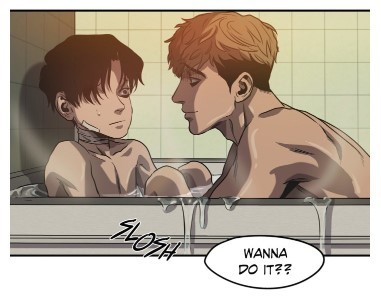
Please note: This meta heavily references the theory I put forth in this other meta I wrote about Sangwoo (x). If you have not yet read it, I strongly recommend doing so before continuing, because a lot of my thoughts on what’s going on with Sangwoo here are built on that theory.
You know, I’m gonna be honest. I always just assumed one of the main reasons Sangwoo kept his victims alive for a while was because, in addition to torturing them, he was using them sexually. This is kind of a gold standard for the horror genera as well as R-18 BL stories that deal with control dynamics, and let’s face it: Sangwoo enjoys hurting people. It’s not a far leap to make. However, when I started to really look at things…believe it or not, it got harder and harder for me to build a case.
Let’s consider the first couple of scenes that set up our expectations for Sangwoo as a killer and a character:
The first thing we’re exposed to, regarding Sangwoo as a Serial Killer, is the woman Bum finds in his basement. She’s bound and gagged and broken legged, but she’s definitely wearing underwear. We know this is not because Koogi is shy about drawing nudity, and it’s sure as hell not because Sangwoo thinks his victims deserve dignity. As far as Sangwoo is concerned, she’s never going to see the light of day again, so if he’s using her in that way, why not just leave her fully undressed?

(That’s a no on dignity.)
Koogi’s pretty great when it comes to storytelling and showing us relevant details, like Sangwoo’s dashcam recording, or the fact that everyone who goes into the upstairs bedroom looks at that one section of the wall with concern.
In this scene she shows us the victim’s rope burns, a red-stained water pipe handle, and an open tool box containing dangerous objects and restraining tape, yet we really don’t see any evidence of Sangwoo having raped the woman. There’s no bruising or blood on her inner thighs, there’re no condoms or torn wrappers anywhere (and we know Sangwoo cares), and here’s the kicker: the opening of chapter three shows a series of images that lead the reader to believe Sangwoo is raping Bum…and then, low and behold, he isn’t.

Although Bum lives in constant fear of Sangwoo’s physical and emotional violence, I can’t remember a single time when he threatened Bum with sexual violence. In fact, the one time Bum offers him sex when he’s angry, rather than taking him up on it and incorporating sex into his punishment, he punches Bum in the face and acts insulted.
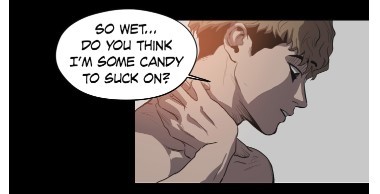
That is not the behavior of someone who’s into punishing his victims sexually. In fact, he seems almost disgusted that Bum would suggest blurring the two activities.
Initially, I thought Sangwoo got off on causing pain primarily because of two scenes: the one where he jerks off on Bum’s feet while he’s choking him, and the one when he’s thinking about killing Bum while choking the telephone poll, and gets a hard on. Add in the fact that his idea of consent is pretty dubious, and that he’s not exactly gentle when he fucks Bum—with the dildo or his dick—and it’s easy to simply apply the label of ‘sadist’ and move on. However, when I looked closer, all these cases had alternate explanations that actually made more sense given his character.

Though he doesn’t look like it on the surface due to his intense overcompensation, Sangwoo is actually very needy for praise and approval.
In the scene in which Sangwoo is punishing Bum for trying to run away, he’s angry and in full-on killer mode when he hangs Bum. Although at first he’s all, “A lot of things are gonna happen where you’re lying down,” while stripping, again Koogi is just messing with us. He immediately clarifies his intent: “In case you’re wondering, I took my clothes off because they’re wet,” a.k.a. “not because you and I are about to have sexy times.”
He doesn’t have a hard on in any of the shots of his pants until Bum is in the air. In fact, as previously mentioned, he just gets angrier when Bum offers him sex. While he’s clearly enjoying the power high of punishing him, there’s actually no evidence that he’s getting off sexually until Bum starts calling his name over and over.
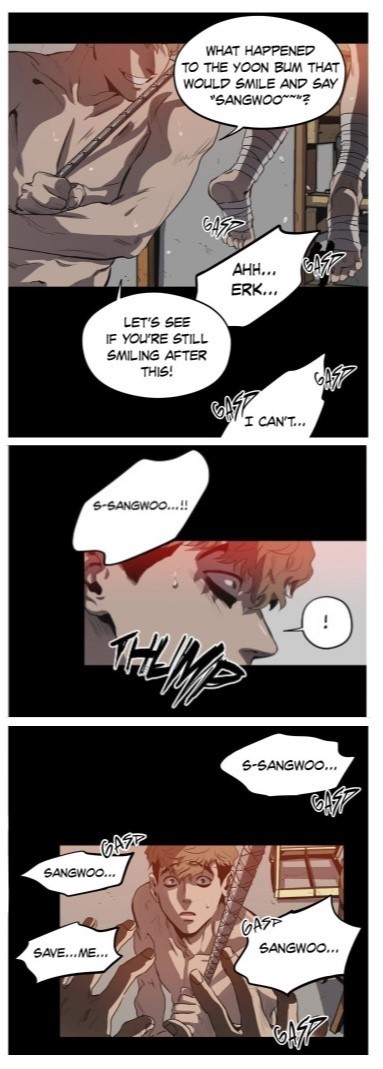

Observe his scowl in the last panel. Sangwoo actually looks irritated that he has to switch gears. If he enjoyed pairing sex with violence, he’d expect to get hard—not seem surprised and inconvenienced by it. He’d also probably attempt to amp up Bum’s pain level the closer he got to climax, where he actually seems compelled to dissipate it. He hurriedly lifts Bum to kneel on his chest, so as to take the pressure off his throat until he’s finished.
Honestly, I think what we’re seeing here is that…though he clearly enjoys having power over Bum, that’s not what he’s getting off on. What turns him on is actually Bum’s appeal to him as a human being.
Compare it against the scene before it, where Bum treated him like the psycho he is, and Sangwoo got increasingly agitated:

Remember, there’s a reason why Stockholm Syndrome is a thing—it occurs when victims are forced to empathize with their captors in order to survive. And the reason it happens is because it does, in fact, up a victim’s chances of survival. This is because bad people don’t usually see themselves as bad—they see themselves as victims, forced to do “bad” things in order to survive, or to obtain justice for perceived mistreatment, or whatever their rationales are.
Like Sangwoo says:

While Sangwoo might have been angry at Bum for trying to run, he couldn’t change the fact that what he wants, more than anything else, is to be seen for who he is rather than the violent things he does. He’s desperate to be seen as a better person than he is (as someone who isn’t “like his father”), so when Bum begs Sangwoo for mercy by name, Sangwoo’s need for validation temporarily overrides his desire for vengeance.
I can only speculate, but I think Sangwoo’s response might have been something like, ‘He doesn’t view me as a psycho --> he likes me even more than my mom did --> holy shit that’s hot.’ Because it looks like even he’s caught off guard by the intensity of it.
Despite having almost zero self control, and always being at the mercy of his uncontrollable rage, I think a small part of him is aware enough to understand assault and love aren’t supposed to go together. And eeevery once in a while, he manages to keep his head above water long enough to make a rational decision.
Although he follows up by drowning and cutting Bum, he doesn’t kill him—which is a step forward from all his previous victims.
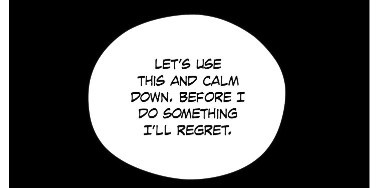
This statement reinforces that: he knows he’s dangerously close to killing Bum, but that he’ll regret it if he does--unlike with any of his previous victims (aside from his mother), whom he exhibits absolutely no remorse for.
I think that, rather than evidence of Sangwoo being a sadist, this scene tells us just how desperate he is for someone to emotionally validate him.
If you consider that Sangwoo might be looking for someone who won’t “betray him” like his mother did, each victim was probably an attempt to find someone who would love all of him, including the insane parts. Except they all resulted in failure until Bum, which is why he looked so astonished when he kept calling to him.
Moreover, I think this exchange is actually the one that ultimately differentiates Bum from all his previous victims, as the one capable of “loving” him despite knowing he’s a killer. And this is important because, I’m pretty sure, this is why Sangwoo started killing people in the first place.
Note that even after he started keeping Bum, Sangwoo continued sharking for victims prior to this event. In chapter 5, as soon as Bum was out of the basement someone else took his place:
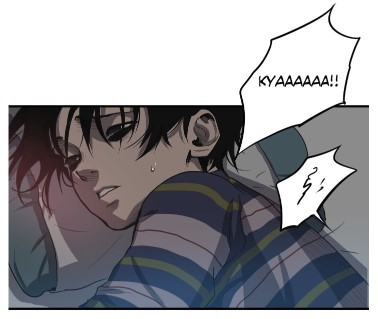
And in chapter 8, Sangwoo was seeing yet another woman:

However, Koogi never showed him killing her.
After this event with Bum, with the exception of the victims Sangwoo brings in as part of his plan to entrap Bum, there’s no evidence that he continued killing. I think this is probably because the need that was driving his psychosis was finally met.
I think the same dynamic is also in play when he gets hard while punching the telephone poll:
If we look at the sequence of pictures in chapter 13, though he’s yelling about killing Bum, he’s thinking of the times Bum’s been sexually sweet and vulnerable with him—the times Sangwoo considers as “proof” that Bum loves him.
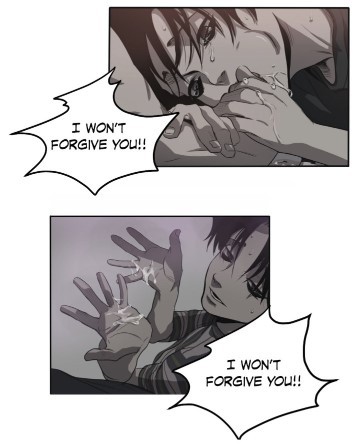
This scene is hard to pull apart because it throws a lot of information about Sangwoo’s state of mind at us, all at once. But ultimately, it shows us that he’s terrified Bum escaping--not because he could go to the police (because that’s never mentioned or even referenced), but because it would mean that Bum had lied about loving him.
And if Bum had lied about that, it would confirm that Bum viewed him as a violent monster (someone like his father), rather than someone genuinely lovable—which is exactly what his mother thought, hence that flash of her.

In his mind, she’s laughing at him from beyond the grave because she’s been proven right.
I don’t think he’s getting hard because he’s thinking of his mother here. If anything, he’s getting increasingly frightened and enraged at the prospect of her being right. That’s why he impulsively punches the pole���because he’s trying to stop her from laughing at him.
I’m pretty sure the thing that made him hard was, once again, Bum’s having been vulnerable with him.
How can we tell? Because of the choice of images: rather than Bum sliced open or nearly choking to death, Sangwoo’s remembering Bum saying he wants to be with him, and cooing his name while blowing him.
Rather than fantasizing about what Bum’s gonna look like when he strangles him, he’s angrily reviewing the evidence he thought proved Bum loved him. And the reason he starts laughing and makes such a weird expression is probably because even though he’s absolutely furious, he’s still turned on just thinking of the little fucker.

(Love is such an inconvenience.)
I think this is why, when he finds Bum sitting on the kitchen floor, he’s so relieved that he can’t even be angry at him for having scared him in the first place (which is what I expected honestly, since dealing with emotional discomfort is not Sangwoo’s strong suit). It’s why the beast of a man wraps his arms and legs around Bum and tells him, “Let’s stay together forever,” while shaking like a leaf.
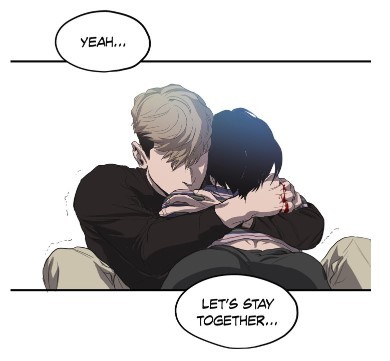
Rather than him getting off on the idea of hurting Bum, or choking his mom or something weird, I think what we’re actually seeing here is the extent to which Sangwoo has fallen for Bum—hard enough that what little sanity he’s got now hinges on Bum staying with him.
This is a dangerously double-edged sword for Bum because on one hand it greatly reduces his chances of being killed, but on the other, Sangwoo will never let him leave.
Anyway.
Returning to the subject, as for his rough treatment of Bum when he’s using the dildo and fucking him on the porch I think, weak as it sounds, rather than any particular desire to hurt Bum, it comes down to Sangwoo not having any idea that anal sex needs to be handled differently from vaginal sex.
Judging from his passiveness, and the surprise on his face after coming in his initial encounter with Bum, as well as his confusion about Bum’s having to get dressed laying down, Sangwoo probably doesn’t have any prior experience of having sex with men.

Additionally, if we look at the hallmark symptoms of Antisocial Personality Disorder (x), it makes sense that Sangwoo wouldn’t have considered that he was hurting Bum while fucking him.
Though it’s never explicitly stated that he has APD, it’s pretty clear that Koogi writes him with these traits in mind because he exhibits every one of them at some point in the series. Accordingly, Sangwoo would not excel at predicting the painful consequences of his poor sexual treatment of Bum, nor would he excel at learning from them.
If you look at the scene leading up to it, it seems like the thing with the dildo was a weird, misguided way of trying to cheer Bum up. It’s the exact same thing he does later in the bath, after Bum slices his wrist open. “I can tell you’re upset and I want to make you feel better --> sex feels good --> sex will fix it.”
I think he really wants to make Bum happy, he just has no idea how to do so. It’s not like his parents gave him many emotional tools to work with in this area.
As a general overview, if we do a quick run-down of situations where Sangwoo’s behaving violently, there are very few instances where he seems to be enjoying it sexually:
He frequently beats the crap out of Bum at the start of the story, but there’s no evidence that he’s getting off on it. He snuggles with Bum after he uses him to stab the old guy, but he doesn’t have sex with him to our knowledge. Though he assaults Bum with the dildo after he kills Jieun, there’s no evidence that Sangwoo was turned on during the killing—in fact, he loses his erection as soon as she kicks him in the stomach. He definitely doesn’t get off after drowning Bum in the bath. And though he slaps Bum when they get back from the police station, he straight up tells Bum that he’s fucking him as a token of appreciation for his loyalty.
Again, in that situation, you see his arousal linked with Bum’s prioritizing his relationship with Person!Sangwoo over Killer!Sangwoo (this idea of there being two Sangwoos is highlighted by Bum’s line about him living with twins with completely different personalities). And although he’s definitely too rough, the fact is…the dudes a beast. He can one-handedly bench press the combined weight of Seungbae and himself. If he wanted to damage Bum, he could do much more than he does. Always.
Likewise, if you come at it from the other side and look for evidence of Sangwoo craving violence when already aroused, most of the time he’s actually downright uncharacteristic in his avoidance of it. When Bum first jerks him off, he’s passive and quiet throughout the whole experience, then ends making this expression:

The first time Bum sucks him off and isn’t very good at it, Sangwoo teaches him not by mocking or forcing him to do something uncomfortable, but by fuckin’ fellating Bum’s fingers. Then, the thing that pushes him over the edge is Bum saying his fucking name in an informal register. Seriously, if Sangwoo is a sexual sadist, this was a very embarrassing night for him.

When Bum’s blowing him in the bathroom after the concert, it would’ve been super easy for him to face fuck Bum until he finished. That would’ve have been awful for Bum, and a ton of fun for a sadist—but it’s like it didn’t even occur to him. He used a tissue, like some kind of fuckin’ gentleman. And I already mentioned above that he lost his erection when Jieun started fighting to leave.
In fact, the only time he ever seems to get off while Bum is in pain is at the end of chapter 35 where, I’m pretty sure, he was getting off anyway and Bum’s pain was just coincidental to his piss poor handling.
Now, you could definitely make a case for him enjoying the sexual degradation of his partners/victims, particularly emotionally. But he seems to draw the line at physically hurting them, for whatever reason.
So, this just leaves us with the inherent sadism involved in rape...

...except Sangwoo doesn’t think of himself as a rapist.
To us as readers, it’s never really up for debate. He makes this statement while continuing to assault Bum, despite being repeatedly asked to stop, which is the literal definition of rape. But this is by design. Koogi is using the dissonance between Sangwoo’s words and actions to make it clear just how un-self-aware Sangwoo really is, and how little we can trust his ability to make sound moral judgments or take care of his loved ones.
Going by his rape qualifier, “listening to a guy scream,” my guess is that his idea of rape is the exact thing he’s always avoiding—mixing sex with violence. Of course, he’s still a rapist even if you go by that standard, because he never stops to consider how his rough handling hurts his partners. But I think he figures so long as he’s not raging on them, it’s not the same. It’s a kind of, “I know how to hurt people and I’m not doing that to you, therefore I’m not hurting you and you’re overracting,” kind of logic. Idk, he’s not exactly a rational dude.
He also seems to rationalize not being a rapist with the mindset that, once he’s got consent up front, he’s got a permanent all-access pass to the person’s body.
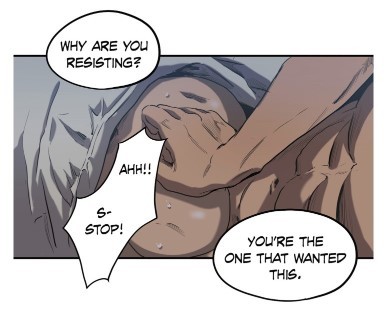
This is not a view held by Koogi (we know because she uses imagery and subtext to highlight how much he hurts his partners by doing this), but by Sangwoo himself.
Bum showed interest in the past and therefore Sangwoo feels entitled to do whatever he wants forever, and my assumption is he would treat his female victims this same way.
In the two instances we see of him seducing women, they seem pretty into it. It’s likely that things were indeed consensual, at least initially.
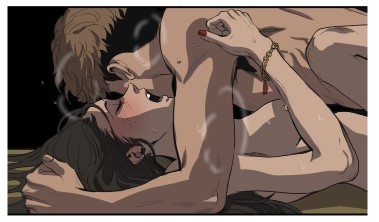

Whether or not he continues to fuck them after he’s kidnapped them is not known to us, but based on the evidence we’ve seen to date, it seems unlikely.
If he were to do so, he’d likely mock them with something along the lines of, “You said you wanted me, why are you resisting now?” just as he did with Bum, then he would use their change of heart as more evidence that women are liars who deserve to be punished (see the other meta for more detail). However, as I said, we can only speculate on that.
But, all this said…can we really call Sangwoo a sexual sadist? The kind of person who would torture or kill his victims while fucking them?
My feeling is, not really.
Going on what we know from the series to date, there’s no clear evidence that he gets off sexually on the pain he inflicts, or that he’s ever attempted to hurt his victims while having sex with them. Because Sangwoo is not known for his ability to control himself, if he had any desire to mix the two, I’m sure we’d have seen him do so by now.
My conclusion is that while he clearly feels emotionally fulfilled, exhilarated, even intoxicated by punishing others...he doesn’t actually get sexually aroused by it.
Lucky you, right Bum?
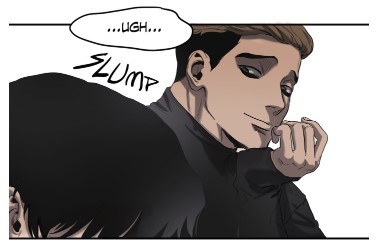
47 notes
·
View notes